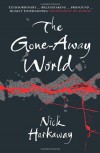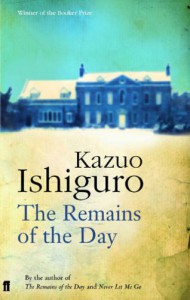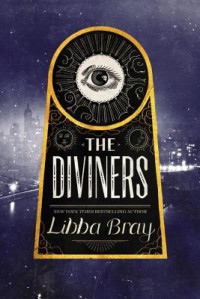Theo's Odyssey
 I tagged this as "liked books" at the time. But that's not really honest, as I didn't think much of this book at all. I'm astounded that anyone has likened it to Sophie's World! In form, yes, I can see the similarity, but I'm afraid that's where the likeness ends. Where Sophie's World was a pretty interesting and serious meditation on philosophy for people not familiar at all with philosophy, Theo's Odyssey was a gluttonous mess of a book which did not manage to familiarise me with many of the salient aspects of religions which I was unfamiliar with and led me to near-despise many of the main cast of characters.
I tagged this as "liked books" at the time. But that's not really honest, as I didn't think much of this book at all. I'm astounded that anyone has likened it to Sophie's World! In form, yes, I can see the similarity, but I'm afraid that's where the likeness ends. Where Sophie's World was a pretty interesting and serious meditation on philosophy for people not familiar at all with philosophy, Theo's Odyssey was a gluttonous mess of a book which did not manage to familiarise me with many of the salient aspects of religions which I was unfamiliar with and led me to near-despise many of the main cast of characters.The primary thing which I would like to comment on is the changing personalities of the characters. Much like the Scottish weather can change as many times as there are minutes in a single day, the characters frequently seemed to have complete personality transplants within a page. Theo himself was at times moody and childlike and teenagerlike and angry and philosophical and wise and foolish. His completely weird behaviour around the Japanese girl (whose name I have forgotten) despite being absolutely mad about this girl from back home is just ludicrous. At first he seems serious about this new girl, and then it's as if it never happens and he's as much in love with his girlfriend as ever? I know that mercurial temperament is part and parcel of being a young adult, but this is seriously ridiculous. Also, there are several times where a seemingly “revelatory” moment will happen to Theo, and then he'll have forgotten about it less than five pages later. It wouldn't have been so bad had the novel been short but this drones on for nearly 600 pages! His aunt, too, suffers from this personality – at once doting on Theo, and being fed up with him, and being afraid for him, and being angry at him.... and so on and so forth ad infinitum. I know this book is written with young people in mind, but I really cannot fathom who would enjoy such absolutely barking mad characterisation. The whole subplot about Theo being ill and then stopping being ill because of his journey is also completely and utterly ridiculous and not in a good way.
The bits about religion themselves are okay but are often completely ruined by the “hilarious” or “thoughtful” character interjections. I don't really feel like Theo actually does learn very much from his experiences – he's a precocious brat at the beginning and a precocious brat at the end. The discussions of the religions jump about a bit too much and I don't feel like, for someone who is apparently completely unfamiliar with the concept of religion, the approach taken by his aunt would really help. Major facets of certain religions are completely skimmed over – I noticed this especially with Christianity, the religion with which I am most familiar, and I certainly felt it with those with which I was less familiar. I was not particularly impressed by this book. I give Theo's Odyssey four out of ten.
The Lightning Thief
 Read this because of my inextricable attraction to Greek mythology. Much better than I expected and passed the time waiting for appointments with my GP!
Read this because of my inextricable attraction to Greek mythology. Much better than I expected and passed the time waiting for appointments with my GP!***
Nothing like watching your relatives fight, I always say.
I have an inexplicable obsession with Greek mythology. My parents gave me a picture book with a number of retellings of the myths (without the naughty bits, of course) when I was a kid which definitely started the whole thing, but I can't explain the persistence of this, and not, for example, my love affair with Dragonball Z. However, here we are.
This modern day tale, loosely based on various aspects of Greek mythology, casts a dyslexic kid with ADHD in the role of Perseus, and sends him off on his merry adventuring way. Percy is a reasonably likeable kid, though I would absolutely have hated him had I been his contemporary at school. If there's one flaw, it's that his voice is very young in these books, and, I would say, inconsistent with his age in many parts of the book. It's made clear that Percy grows up a lot over the course of the novel, and that he has a lot to deal with at home, which he seems to have a reasonably deep understanding of even at the start of the novel – his understanding of the dynamics of his mum's relationship for example. As such, I found it somewhat baffling that he so often sounds so utterly juvenile. Fair enough at the start of the book, where Riordan's trying to showcase “wild-child” personality, but I felt like by the end of the book the character had outgrown the box that the author was trying to squash him into with the dialogue he was giving him.
I liked all the little twists on the Greek stories that occur throughout the book. Some of them are obviously a bit shoehorned in, but I found it still worked quite well. Also, I'm a sucker for stories that involve boarding school/camp type things. I don't know if it's my inner only child that somehow thinks it would be great to be around peers all the time (and also recoils from any such suggestion!) but there's something fascinating about scenarios where children and young adults break away from their families at such a young age.
This is a really good book for children who are less likely to read, I think, and it definitely feels like a boy book, which is outside my usual reading. For all it's flaws – it is rather simplistic and clunky – I think I'll be reading the next one. Also, I think it's a pretty good introduction to Greek mythology – and indeed the concept of mythology – for the very young. I give The Lightning Thief six and a half out of ten.
Animal Farm
 Can you not understand that liberty is worth more than just ribbons?
Can you not understand that liberty is worth more than just ribbons? Man, that Orwell sure knows how to write.
This is a fantastic book, and one that I think is well worth reading to and with kids to spark discussion, which is, I understand, a way in which it is often used. The metaphors in this book are simple but elegant, in a way that is all too often lost from dystopian/utopian fiction aimed at children and teenagers (I'm looking at you Lord of the Flies and The Giver). There's no language in here that would bother a bright child but at the same time it doesn't ever feel patronising or “dumbed-down” (a phrase I've come to loathe). It just is what it is – a story that has resonant themes to which we can all relate, in some ways now more than ever.
Again, this is a story where everyone knows the plot, so I won't really touch on that. This story is clever, and witty, and apt, and surely needs no recommendation from the likes of me to encourage people to read it. It is stimulating, even as an adult, and is the perfect gateway drug into the likes of 1984, Catch 22, Fahrenheit 451, and many other highly esteemed novels of a more adult bent.
PS. I came across this in, of all things, an abridged version (which, I might add, is very nearly as long as the thing itself but with all the nice turns of phrase removed). So don't read that. The original is not terribly difficult, after all!
11.22.63
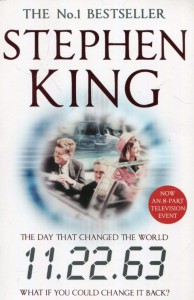 Sometimes a cigar is just a smoke and a story's just a story
Sometimes a cigar is just a smoke and a story's just a story And what a story this is. I'm not sure where Stephen King came up with the idea for this book, but it's a hell of a thing. Part time travel, part thriller, part love story. I enjoyed the slow build up, the reveal of how the time travel takes place, and the various peaks and troughs that take the main character to where he needs to be on that fateful day – this book is certainly worth a read.
The main character is your typical Stephen King main character, as sort of everyman searching for something in his life. He's given the opportunity to go back in time and for some reason he and his co-conspirator decide the best use of this opportunity is to prevent the Kennedy assassination. Which seems somewhat simplistic to me, at best. I know this kind of plays out, in terms of the fact that it doesn't really improve anything in the future, but I'm just not certain where the fixation on that particular moment stems from in the first place. I don't get the sense of why they both believe it possible that preventing it would make everything better? However, I have to also accept that 1. I am not American, and 2. I was born 27 years after the Kennedy assassination. So perhaps the impact and magnitude of the event – which I know and feel to be great – is even in excess of that which I can imagine.
I enjoyed a lot of the dallying around that happens prior to get into the meat of the story. As is, I suspect, somewhat common with Stephen King books – though I don't have the grounding to back this up – there is a lot of filler in these 740 pages. For example, the two iterations of the murder of the Dunning father could have been done a lot more effectively. The part of the book with Epping as a high school teacher felt comparatively short, and I was enjoying that part so much that I really wanted to spend more time there. I found the parts where he was trailing Oswald intriguing at first, but they quickly became tiresome. They were repetitive and didn't really add much to the depth of Oswald as a “character”. The whole point from the beginning was that he was a repulsive piece of work, and the only question is whether he was a repulsive piece of work with the balls to do what he was accused of doing. So it's kind of tiresome to spend so much time proving over and over how odious his behaviour is when we already know that. Also, regarding the romance Epping is painted as not being totally convinced at the beginning that stopping the Kennedy murder will fix things. Given the apparent strength of his love for Sadie, I kind of felt like it was unrealistic for him to pursue Oswald with the zeal that he did, sacrificing the possibility of continuing their love. I don't know, I just feel more like he would have stayed with Sadie. It was a sweet love story though.
Overall, I really did enjoy this a lot. I just feel like maybe if it had been about 200 pages shorter, it would have been more special. I give 11/22/63 eight out of ten.
How to Save a Life
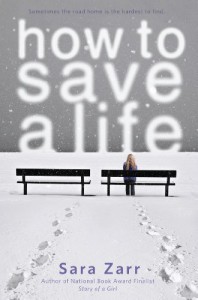 It's a jagged thing in my throat, how much I miss her.
It's a jagged thing in my throat, how much I miss her. This is a sweet, wistful little book, that is completely implausible in concept, but rather deftly written. The basic plot is that Jill's mum takes in a young girl who is pregnant as she (the mum) is going to adopt the baby when it is born, at which point the girl is free to get on with her life. It is pretty much obvious from the beginning that Jill's mum is going to end up adopting the teenager and have them all live together like one big extremely weird happy family.
I felt like everyone was drawn in a bit of a caricature. Jill is officially Not Coping with her dad's death, Mandy (pregnant chick) is super naïve and annoying, Jill's boyfriend is clearly getting less into their relationship, and Jill is clearly falling in love with this other dude. It's all pretty much set out at the start and everyone's issues are resolved in the ways that you would expect in your standard young adult plot. Everyone apart from Mandy is very nice and middle class and utterly respectable.
So why did I enjoy this? I don't know. Having lost my dad at a relatively young age, I'm always interested to find narratives that deal with this kind of sudden death in a realistic setting. I feel that this book did a reasonably competent job of it, though it stuck pretty rigidly to that idea that those grieving will find it difficult to let others in – until it all comes pouring out in one burst, and things start to get better, and that there is a pressure to “hold it together”. This can be true, and often is, and I certainly relate to some of it, but I feel like all too often grief is treated as a monolith, as a fixed object that reduces over time. Instead, it's mostly chaotic, or it was for me. I was largely fine, if extremely teary, after the event. It's only the months and years afterwards that give rise to what grief is, I believe for the majority of people – a shapeshifting monster of a thing that reappears when you least expect it and colours your entire perspective. I'm still grieving, now. My grief was and is anger and pain and misery and depression and anxiety – it was all of these things, differently, sometimes separately and sometimes simultaneously. It was and is not always visible and it doesn't manifest in the ways you would expect. All of this is okay. The number one thing you can expect on the death of a parent is that you are probably not going to be okay. As time goes on, what that means will change and dissipate, but the fundamental thing is that it cannot be undone and the grief does not leave. It just changes with you.
Anyway, to get back to the original point, I feel like this area is touched upon, but for the most part, Jill's grief is a bit of a monolith and I couldn't really engage with it. In the same way, Mandy's nasty background was a bit of a crayon drawing of a nasty background and she is the obvious result of it. The depth was somewhat missing. However, the writing was pretty exemplary, and I feel that's what really holds this story together. It's not reinventing the wheel – not even the YA wheel – but Zarr certainly knows how to put a sentence together and have you grasp the full meaning of it. It's not the just the words she does use, but the words that she pointedly doesn't use, that impress the nature of the characters on to you. And that's no mean feat. I'd definitely read something else by this author despite my slight misgivings about this book. I give How to Save a Life seven out of ten.
The Giver
 The worst part of holding the memories is not the pain. It's the loneliness of it. Memories need to be shared.
The worst part of holding the memories is not the pain. It's the loneliness of it. Memories need to be shared.Well, I just super didn't care about anything in this book. You remember when I said in my review of Divergent that it didn't matter that nothing made sense because it was fast paced and fun? This was like the opposite of that. I was just so bored – I couldn't get invested in any of the characters because they didn't seem like real people. I know that's part of the conceit, but for god's sake. So much time was spent just talking about the mechanics of the world without anything actually going on, just... lots and lots of explaining. And then we get to the part with The Giver. And it is totally stupid. How in god's name did they remove all of the colour from the world or remove your ability to see it? Ugh. That's only the beginning of the stupidity, but there you go.
Sigh. I know I'm probably being unfair, but I didn't give a shit about what happened to Jonas. He gets to the age of adulthood, gets a job, turns out it's kind of a shitty job and kind of a great job at the same time, realises his parents aren't who he thought they were, and runs away from home. So what? This just doesn't say anything for the wider ramifications of what is happening in his world. It doesn't say anything about anything. Also I didn't quite believe that his dad was just a complete baby-murderer who behaved completely normally the rest of time. And who builds up a relationship with this little boy only to have him sentenced to death? It just doesn't really seem plausible. . Plus it kind of felt like all the different kinds of love – familial, friendship, romantic, sexual, and humanitarian, and so on, were all conflated and not really treated as separate and different phenomena. I don't think it was really well enough explored in terms of the different virtues and faults of suppressing each of these in turn. I'm not really sure what kind of point Lowry was trying to make. Trying to control entire populations to this level is bad? Shared memory makes our society more whole? Killing babies is wrong? I just don't feel like anyone gains anything from reading this that they wouldn't gain from reading 1984 and I think at the point that a child is ready for this book, they're only a few years at most off being ready for that one and they might as well wait.
Also I hate the ending. I feel like it was just one incredibly stupid set of events and then nothing happens and the books ends and you get to make up your own mind! Jesus. Nope. I was not about this book at all.
However, that said, I didn't HATE it. And the writing is nice in places, if a little sparse. And I'm nothing if not generous. I give The Giver (snerk) four out of ten.
Lord of the Flies
 Maybe there is a beast… maybe it's only us
Maybe there is a beast… maybe it's only us Yeah, that quote just about sums up the subtlety of this book for me. I mean, not that lack of subtlety is a prerequisite for enjoyment, but I just didn't get out of this book what I might have done had it been a formative experience for me. I read this book this year, at the age of 23, instead of at school, where pretty much everyone else read it. Sometimes you can get over it, sometimes you can't. Sometimes you're better off just watching The Simpsons episode that covers the same ground. This is one of those times.
Everyone knows the plot, so I don't think there's any point in regurgitating it. I think my first problem with it is that I fundamentally disagree with Golding about the moral message that he's sending with this book, though I can see why it might have been useful tool at the time – I just think there are caveats to the idea that anyone has brutality inside of them, especially when a certain group mentality sets in. But I think the other failing of the story is that, for me, this central idea is all there is to the book. I didn't particularly enjoy the prose – I found it stilted and sterile. I didn't particularly enjoy the story, perhaps because I knew where it was going, or perhaps because I felt that I saw so little inside the heads of the people involved, except by way of the few incidents that make up the book. I just didn't particularly like anything about the story or feel anything when I read it. Big things, disgusting and terrifying things happened in this story, and I just sort of shrugged and still felt like all it was was a story, a tale of morality (or lack thereof) and not something that swept me away.
Again, this is all strictly personal and I can see why it is so widely read and why people encourage its reading. I can't decide whether its distinct lack of any sort of female presence had something to do with my inability to relate to the story. I think maybe not, but it's probably something to consider. I didn't dislike the book, and I wouldn't say it isn't worth a read – in fact, my relatively high rating despite my personal dislike mainly reflects the place this book holds in my understanding and that of others of relatively recent literature – but it's not something I would ever be convinced to reread, I don't think.
I give Lord of the Flies seven out of ten.
Insurgent
 Like a wild animal, the truth is too powerful to remain caged.
Like a wild animal, the truth is too powerful to remain caged.Well, I felt like Insurgent was Big Dumb Fun just in exactly the same way that the first book was. I know a lot of people didn't agree, and it might be because I sped through it in a couple of hours, but I was really satisfied with the way this book progressed. Let's face it, this book is escapism in a really ridiculous fashion.
Tris is the main reason I keep reading these books. Tris who is sixteen and young and stupid and brave and athletic and makes ridiculous decisions but whose heart is always in the right place. I like that she is somewhere in the middle – neither perfect nor with cripplingly low self-esteem, neither always right nor always wrong. Her relationship with Four doesn't define her ( her willingness to go behind his back and consort with Marcus pretty much shows that, even though it's probably not the best decision, because it's the one she thinks is right and most beneficial to the most people at the time – possibly a wee bit impulsive, but that's in character too). The Faction system continues to be completely unworkable, but if you can't accept that you probably haven't made it this far anyway.
It isn't as good as Divergent. I think that Tris's angsting about killing Will was a bit much. I'm glad it was included but it goes on for far too long and in a story where so much is happening at once, it didn't really need to be rammed home this much. Plus, I feel like it's a bit out of character. Tris shows herself to ultimately be pretty pragmatic about what happens in this situation and it seemed more likely to me that she would confront her gun fear and move on than keep this going til the end of the book.
I'm going to keep this short as I read it three months ago and I'm worried about spoiling certain things from Allegiant. However, as long as you don't go in expecting everything to suddenly start making perfect sense, this should be an enjoyable enough read for you. I give Insurgent eight out of ten.
The Fall of Hyperion
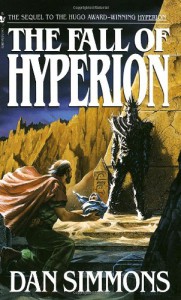 Pain is the curl and foam of a wave that does not break.
Pain is the curl and foam of a wave that does not break.So, I'm writing this review around three full months after reading The Fall of Hyperion, and I'm still not really sure what to say about it. Did I enjoy it? Absolutely. Did I think it was as good as Hyperion? Absolutely not. But then, in the realm of science fiction, Hyperion, for me, was a cut above the rest. This is a perfectly satisfying conclusion, one that I am happy with, and one that answers a lot of the weirdness that went on in Hyperion.
As my memory of what happened at what point in this story wanes, I have but a few general points to make about the story. This very much feels like a resolution, in that almost all of the question that you have at the end of Hyperion – and there are or will be many! - are answered in a way that might be satisfying to you, or might not, depending on what you really wanted out of the story. I think, perhaps, my favourite of the character progressions/”stories” were those of Meina Gladstone and Sol Weintraub (though not that of his daughter – which I know sounds weird given how tied up they were together. But what happens to him in the story is fine, while the whole Rachel/Moneta thing felt both creepy and overly-convenient to me. It's probably not a point I could solidly defend, but it is one that reduced my enjoyment of Rachel's involvement in things.) The extended portrayal of Sol's grief and hope really felt incredibly realistic to me, so I appreciated the sensitive treatment of such here.
As for Meina, well, I just have a thing for morally ambiguous female leaders (Malazan slight spoiler think Tavore in MBotF, perhaps?). The exploration of the relationships between the AI and the humans is much more fleshed out here too – I had some difficulty in grasping it in the first book but my fears were allayed by the events of this one. That doesn't hold true for some other things, though. I found what happened around the Time Tombs often felt like a bit of a plot device that changed to suit the other places he wanted the narrative to go. I also felt like ( the bits with the Keats persona dragged a little. I don't know if it was just me, but I would have preferred not to spend quite so much time with him compared to some of the other things that were happening or could have potentially happened.) I really wanted to spend more time, for example, on the Priest's story and the Catholic Church as a whole – I felt the way that organisation had shifted (and not shifted) over the years to be really intriguing, and I just wanted to read more in that direction.
I've been well warned by someone I trust to end my relationship with these books here, and so I shall. But it's been incredibly enjoyable and rewarding. While I may not have enjoyed this book as much as the first, it's far above average science fiction, and definitely one to read if you enjoy the genre. I give The Fall of Hyperion nine out of ten.
The Secret History
 Does such a thing as 'the fatal flaw,' that showy dark crack running down the middle of a life, exist outside literature? I used to think it didn't. Now I think it does. And I think that mine is this: a morbid longing for the picturesque at all costs.
Does such a thing as 'the fatal flaw,' that showy dark crack running down the middle of a life, exist outside literature? I used to think it didn't. Now I think it does. And I think that mine is this: a morbid longing for the picturesque at all costs.The Secret History is an odd sort of book. It feels like a weird mishmash of ideas, part-Brideshead Revisited, part-Talented Mister Ripley, part-The Great Gatsby and part-infused with the cynicism inherent in a lot of modern literary fiction (I felt overtones of the same atmosphere in Atonement and The Magicians too, though I liked those books much, much less.) It is, in essence, a murder mystery that begins with the murder and ends with mystery, perhaps more than I would like.
I'm not really sure what it was that ultimately worked for me - I think it was the cohesive nature of the plot that held together. The overarching mystery about why each of the characters acts in their own particular and specific way was truly compelling. It's also very easy to see how Richard ends up embroiled in the world of these rich kids, wanting to believe that there is something special about him, about all of them, that he is chosen. That the book opens with a death makes it pretty clear that things aren't really going to end well.
Tartt's prose is good, in some places great. And she knows how to withhold the right amount of information, how to tease you through the plot and make you feel like you're always on the point of revelation - but never actually giving it all away, even at the end. This is one of her greatest strengths - but at the end, I didn't feel like it was enough. The characterisation is great in places - Richard, for example, is fully believable as someone from an obscure background who wants to move beyond that - but weak in others - Henry is a bit of a sociopath and I don't really get much else from him. I think that is partially the point, but I don't really feel like she made it work all that well. I didn't buy Camilla's attraction to him either, especially after the length of time that had passed at the end - I could maybe even accept it in the context of the period while they were at college but not after the fact.
Like I said though - compelling! I enjoyed being suckered into the college-y world and the gradual disintegration of everything that Richard has believed about himself and the others. I was also kind of glad that nothing terrible happened to Richard because I did just feel awfully sorry for him most of the time even though he was a complete ass. I give The Secret History eight out of ten.
Divergent
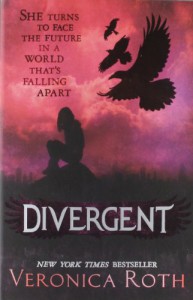 We believe in ordinary acts of bravery, in the courage that drives one person to stand up for another.
We believe in ordinary acts of bravery, in the courage that drives one person to stand up for another.I first came across Divergent last year (what can I say? I’m always late to the party!) when I heard about the film of it. To tell the truth, it sounded awfully like one of those books which has spawned as a result of The Hunger Games. Now, as I’ve mentioned before, The Hunger Games really wasn’t my bag. I found Katniss incredibly obnoxious at the time and I generally found it pretty predictable. However, I think I brought a lot of prejudice in terms of my expectations of literature and particularly young adult literature at that time. To that end, I’m definitely going to give it another go at some point this year.
But this isn’t about the Hunger Games, this is about Divergent.
I absolutely adored it.
To me, this book is the ultimate “suspend your disbelief” book. No, the world-building doesn’t make a lick of sense. It’s not a 1984 kind of dystopian, in the sense that you can pinpoint areas of that society which are relevant and even comparable to ours. Divergent is the sort of book where you either accept the initial premise for what it is, or you don’t. If you can’t, then you’re probably not going to enjoy the book. That’s not a criticism. There are things, such as The Hunger Games, for which have not been able to suspend my disbelief, but many others have. However, Divergent just grabbed me. It was exactly what I needed to start my year off with: easy to read, well-paced, and just plain fun.
What really sold me on it was Tris. I really loved her. One of the great things about her characterisation is that she finds self-belief pretty rapidly over the course of the novel. Even right at the start, when she’s chosing her faction, she makes a decision based on her own inner compass and for no reason other than that. Too often, female protagonists in young adult novels suffer from either a lack of self-esteem (cf. Cath in Fangirl, which I disliked) or are pigeonholed into the strong action-girl emotionless role (which was my original problem with Katniss, though as I said, it will take a reread to discover whether I still feel the same way). To my mind, Tris is much more well rounded than this. I love that she has obviously negative traits - the impulsiveness that gives way to losing her temper, the cruelty that this engenders - and I love that she has strength in abundance, not just physically but mentally. She makes mistakes, but is pretty accepting of the fact that mistakes happen, and they can be forgiven, both by herself and others. At the same time, she has the tenacity not to forgive what should not be forgiven. She shows her strength to Four, but also allows herself to be vulnerable with him. She tells Four she isn’t pretty, but realises that whether she is or isn’t pretty isn’t the be all and end all of who she is anyway. And she never feels like she should have to apologise for what she is - Divergent - even though she has to hide it for her own safety.
That’s not to say I didn’t have any feelings for the supporting characters either. Four is a pretty decent character. I’d like to see more of what he’s like away from the construct of the Dauntless faction. I sometimes found it a little hard to get a sense of him as a fully realised person but I guess that reflects Tris’s perceptions of him as well. Christina is fantastic - again, she’s another female character who is entirely herself. And Al - the changes in his character were something I could have not predicted. Roth did a very good job of making you feel conflicted over his part in proceedings. If I had one criticism of the characterisation it’s that some of the villains - Eric, Janine, and Marcus in particular - are a bit one-dimensional. Obviously it’s hard to say at this stage whether that will continue to be the case.
Otherwise, the plot was a touch predictable, but I wasn’t really too bothered by that. The breakneck pacing was so good that any of the more straightforward plot points were easily overlooked. Like I said, the world-building is something that will probably be a problem for some people. If you think too hard about the Factions and how this came about and how this world lasted - the whole thing comes a bit unstuck. However, if you can accept that these are the rules and this is how this world is - then it’s a pretty exciting read. It helped me to think of it as a world completely divorced from our Earth, if that helps anyone else at all.
None of these little niggles managed to overcome my enjoyment of this story though. Rarely have I read something that was so unabashedly fun as this. I give Divergent nine out of ten.
 1
1
Harry Potter and the Philosopher's Stone
 I "reread" this over the last week or so by listening to the Stephen Fry audiobook. It's fantastic. I seriously recommend it for anyone who's read the books before but would like a slightly different experience. I'll certainly be listening to the other ones! Also, this is book 100. I achieved my challenge!
I "reread" this over the last week or so by listening to the Stephen Fry audiobook. It's fantastic. I seriously recommend it for anyone who's read the books before but would like a slightly different experience. I'll certainly be listening to the other ones! Also, this is book 100. I achieved my challenge!***
Harry Potter tends to be one of those things that either works for you or it doesn't. I was just about the right age when the books came out (I must have been around eight-ish when I read the first two and it continued from there) and I always felt that contributed to my affection for the series; I was almost seventeen when the final book was released and just in that same period of almot-adulthood that the protagonist was enduring at the same time.
I've read (and reread) all of the books several times. This first is a reasonably simple adventure story right until the end, and I can't fault it for that. There are hints of things to come in the future - nothing is more prescient, nor creepy, than the suggestion that Dumbledore set it all up so that Harry and Voldemort would face each other - but nothing too heavy. Although, in saying that, retrospectively the Mirror of Erised scene is a bit fucked up. I'm not sure I would like to be confronted with my heart's deepest desire like that, though I suppose that's sort of the point.
These books were responsible for a lot of my formative reading development, and for that I can't fault them, but I appreciate that this is one of the less fully-formed installments.
Everything Is Illuminated
 Ugh, no. The writing was juvenile (I mean, I know he was younger than I am now when he wrote this, but COME ON). I am severely turned off by body function humour - I just don't like it. The descriptions of Brod were creepy to me, beyond feeling like they were being imputed to the members of the village - I don't know why certain male authors feel the need to have young female characters who are depicted in this way in their books, but, like in The Windup Girl, this is a total turn-off for me and is what ultimately led to me putting the book down. There is literally nothing I could recommend about this. The idea was terrible, the prose was terrible, the characterisation was lukewarm to good, depending on the scene. I just don't care enough to continue.
Ugh, no. The writing was juvenile (I mean, I know he was younger than I am now when he wrote this, but COME ON). I am severely turned off by body function humour - I just don't like it. The descriptions of Brod were creepy to me, beyond feeling like they were being imputed to the members of the village - I don't know why certain male authors feel the need to have young female characters who are depicted in this way in their books, but, like in The Windup Girl, this is a total turn-off for me and is what ultimately led to me putting the book down. There is literally nothing I could recommend about this. The idea was terrible, the prose was terrible, the characterisation was lukewarm to good, depending on the scene. I just don't care enough to continue.
